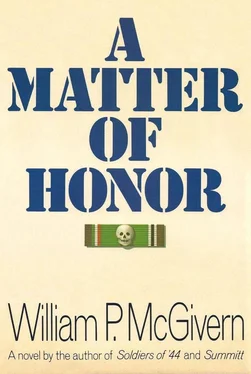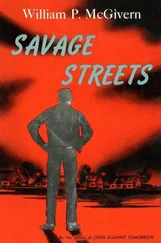Sergeant Malleck looked at his watch. It was still a few minutes short of his whiskey deadline but this Lasari character rated a little celebration. With a sigh, almost sensuous, he went back to his desk and opened the side drawer.
Earlier, Private Scales had warned Corporals Eddie Neal and Joe Castana that Malleck had been in a foul mood, so the two soldiers were surprised to find him leaning back in his padded office chair, booted feet on the desk, ruddy face touched with a faint smile. They saluted the top sergeant, then stood at attention, waiting for him to speak.
Malleck was in no hurry. He stared at them coolly, shifting his eyes from one man to another, from their uniforms to their hair to their waxed boots, as if he was examining and evaluating them for the first time.
Corporal Joseph Castana was in his late twenties, stocky, with weightlifter’s shoulders that tapered sharply into a flat stomach and narrow hips. His hair was black, cut as long as army regulations would allow, and he wore thick moustaches with drooping ends, clipped off at the exact line of his thin lips. He smiled quickly at Malleck, his teeth strong and white, then rubbed a hand across his hard, brown face, as if to wipe away an unwanted look of mirth.
Malleck shifted his impassive stare to Eddie Neal. Neal was a head taller than the Chicano, a country boy, a rough, down-home type with tousled blond hair, big hands and high color in his healthy cheeks. His expression was respectful and boyishly expectant as he waited for Malleck to speak. But Malleck knew, from long experience with Corporal Neal, that his boyish appearance and manner had nothing whatever to do with what was going on in Eddie Neal’s mind. His courtesy, his smiles, his fresh, close shave and his immaculately tailored uniform were camouflage and defense for Neal’s surly tempers, his honed memory for hates and grudges, and for the illegal switchblade that was socketed carefully inside his Army boot.
“We got ourselves a new mule lined up, a deserter,” Malleck said, “but he may need a little breaking in.” He pushed Detective Salmi’s note across the desk. “His name is Lasari. It’s all there, where he lives, where he works...”
Neal started to reach for the paper, but Castana was closer to it. He picked it up and studied it, running a thoughtful linger over an arc of moustache.
Eddie Neal shrugged his shoulders and smiled. “Go ahead and read it, Tonto,” he said.
“You want to read it, Eddie? Be my guest.” Castana offered the note to Neal, who shook his head.
“No, you got hold of it first. I figure you got that much ABCs. Read it and tell me about it.”
“All right, snap to attention, you ignorant clowns!” Malleck shouted, his voice suddenly hoarse with rage. He swung his booted feet to the floor. “Don’t waste my time with your shit!”
The two soldiers stood erect, eyes fixed at an imaginary point on the wall above and beyond the sergeant’s head.
“All right, I’ll tell you both about it and don’t you forget,” Malleck said, lowering his voice. “Start staking out this ginzo tonight. Locate his shop, drive by where he lives, ask some questions in the bars he hangs out at. Wear sport clothes, buy people drinks, make sure Lasari gets the word that somebody’s on his tail. I want him windy. If he turns himself in to the authorities, he’s got an edge. But I figure he ain’t gonna do that. He’s waited too long.”
Malleck leaned back again and the chair springs creaked under the weight of his powerful body. “We want him to make a break for it, then we grab him. He’s a fugitive, a fucking deserter, he’s gonna run, resist arrest. Make sure he resists, understand? But wait for my orders. When the time comes, don’t let him bullshit you by putting up his hands. When I say take him, you take him hard, so it looks like he fought back.”
Malleck smiled suddenly and the movement hardened the firm circles of flesh on his cheekbones. “We’ll show him Army,” he said. “This Duro Lasari’s ass belongs to us. We can kick it or whip it or hang it up from the rafters to dry out. We’ll just fix the paper and send him right to the federal pen if he’s too dumb to cooperate.”
When he was alone in the office, Sergeant Malleck placed a call to an Army base in Colorado and talked to a tech specialist in Records. Malleck identified himself as a special assignments officer, told the young woman that he needed, by express mail, all records on Durham Francis Lasari.
When the sergeant told him he needed an authorization for a records transfer, Malleck assured her that he knew that and the proper forms were already enroute to the Colorado base.
After hanging up, Malleck stood, sucked in his breath and removed a key from the pouch on the inside of his Army belt. He unlocked a bottom desk drawer and took out a metal file box with a combination lock. Malleck opened the box, took out a form sheet and a rubber stamp. Then he typed out, in correct, official language, a request for the service records of Durham Francis Lasari, affixed a colonel’s signature to it with a rubber stamp and folded the paper into a regulation air mail envelope addressed to the military records office in Colorado.
The sergeant chauffeured himself through drizzling mist into the Loop, parked his car and walked two blocks to the main post office to mail the letter himself. Then he drove to a German restaurant, the Black Forest, on Quincy Street, used exact change in a public phone booth to put in an overseas call and sat drinking beer at the bar while waiting for the call to go through to Sergeant Ernest Strasser in Heidelberg, Germany.
When the phone rang, Malleck crowded himself into the booth, pulling the folding door shut behind him. He cupped his hand around his mouth and talked to Strasser briefly. “The pigeon’s in the coop, old buddy, message intact. Another’s on the wire when the weather is right.”
Strasser thanked him and assured him that his message came through A-OK. “Birthday greetings from us are in the mail.” The sergeant’s voice had a distant, tinny resonance but the words were clear. “And we can service your Blue Rock from this side whenever you’re ready.”
It was all working, Malleck thought, a sense of satisfaction flowing through his body like the warmth of the first whiskey at dawn. And it would work again.
It was early for lunch but Malleck seated himself at his regular table. He ordered another stein of dark Wurtzberg and then told the waiter he’d like roast Thuringer sausage with red cabbage for lunch, and a half slice of Black Forest cake, to be served with a fresh beer at exactly half-past twelve.
He checked his watch against the ornate wooden cuckoo clock on the restaurant wall, the heavy pendulums, carved like long, thick pine cones, swinging rhythmically.
“Your clock’s cuckoo, Pops,” he said, “five minutes slow. I got twelve o’clock on the mark.”
Captain Hays “Froggie” Jetter, a U.S. Army Intelligence officer stationed in Washington, D.C., sat at his desk in a small, overheated office and looked out at the snow swirling beyond his windows. Jetter wore a business suit and his section was quartered in an old government building which stored census records and a library of rare law books dealing with Civil War reparations legislation. The frosted glass office door was unmarked except for a single word in neat block capitals: PRIVATE.
Captain Jetter had just replayed for the fourth time the taped telephone conversation he’d monitored earlier that day between First Sergeant Karl Malleck at X-14th Headquarters in Chicago and a technical specialist at Records in Colorado. Like an expert reading a lie detector test, the captain listened carefully to everything Malleck said, trying to note hesitancy, blatancy, or an incriminating waver on given words, but the sergeant’s voice was casual and controlled, almost jocular. Jetter scrawled three words on a notepad and underlined them twice. Special Assignments Officer. In the U.S. Army, the captain knew, there was no such title.
Читать дальше












